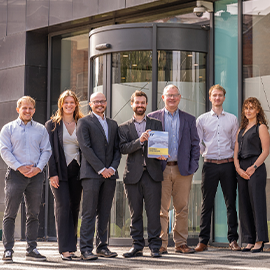How does this course set me up for my future career?
Making your career happen is at the heart of all our Business courses – with every module designed to reinforce the transferable skills you’ll need in the workplace. We’ve also introduced two dedicated modules focusing on career-development skills: Marketing Study and Consultancy Skills, and Preparing for Professional Practice.
Beyond the classroom, you’ll have opportunities to develop your career through practical experience and wider learning. In your second year, you can spend a semester studying abroad, or take an extra year before your final year studying elsewhere in the EU, or further afield such as the USA, Australia or China.
There’s also the option of a work placement year, while our Marketing Internship Programme is on hand to help you gain hands-on marketing experience. And there’s our Business Clinic, offering you the chance to work with real clients to help solve their business challenges.
Once you complete your studies, you’ll be ready to pursue career paths across a wide range of sectors – with a particular edge in roles such as a marketing executive or a branding strategist thanks to your specialist learning. Should you wish to push your knowledge even further, the course also prepares you for postgraduate study – for example, on our MSc in Digital Marketing.
Or, if your inner entrepreneur comes calling, you can take inspiration from our previous students’ outstanding track record, with the combined turnover of Northumbria graduate startups higher than any other UK university.
Whatever you decide to do, you’ll have strong employability as a Northumbria graduate as every module of Northumbria Business School courses reinforces what you need to succeed. This includes the transferable skills that really matter to employers such as critical reflection and self-learning, collaboration and curiosity, and the ability to solve problems in sustainable and ethical ways.
 Option for Placement Year
Option for Placement Year Option for Study Abroad
Option for Study Abroad



.png?h=150&w=129&modified=20240806102356&hash=1FA7CF92A7BF4A75F2E8FA53AF618C22)


































